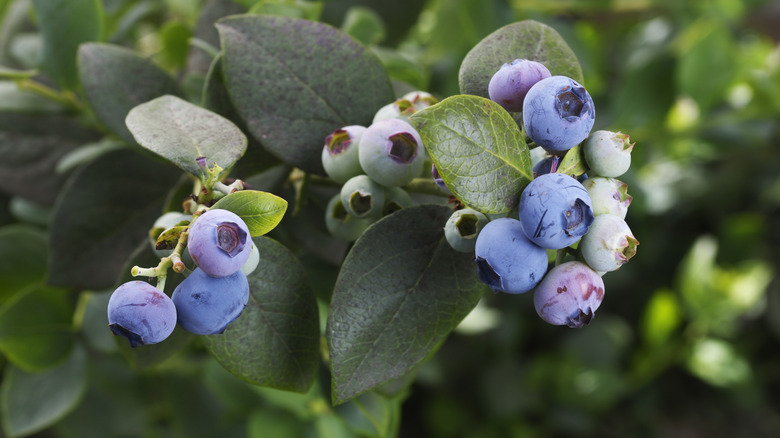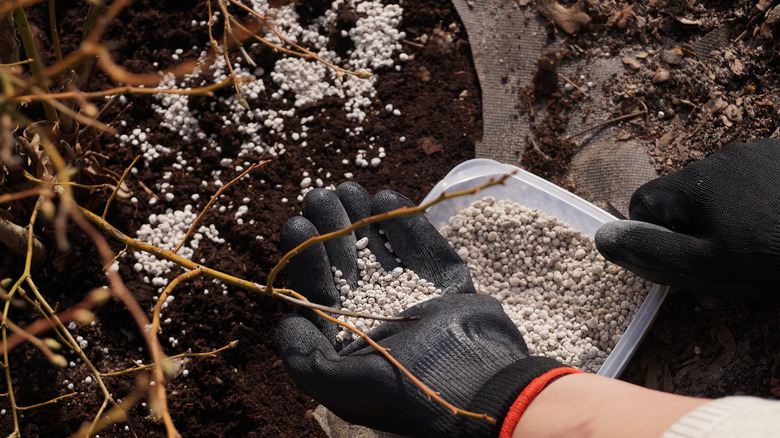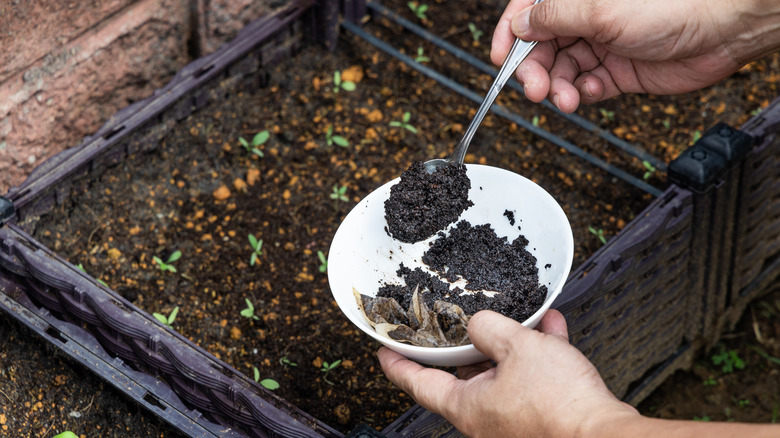The Best Time To Fertilize Your Blueberry Plants
Growing blueberries in your garden is easy since they require low maintenance. They self-pollinate, providing you with juicy berries for summer. When blueberries aren't growing, you're left with a gorgeous green bush year-round that produces bell-like flowers in the spring. However, to get your fruit growing and thriving, it's essential to fertilize it at the appropriate time. Fertilizing blueberries three times a year in the spring, summer, and fall will ensure your fruit receives the nutrients they need. Not fertilizing your blueberries on time or using the wrong fertilizer can deter their growing stage.
While blueberry bushes can elevate your landscape, if you don't have enough space in your yard to grow them, they're excellent for growing in raised beds or containers. They just need a small, sunny spot to thrive. Blueberries can withstand winter climates, so you don't have to worry about them dying out in the colder months. As long as they're taken care of and fertilized, you'll have blooming flowers in the spring and fresh berries every summer.
Fertilize blueberries in spring, summer, and fall
You should fertilize blueberries at least three times a year to see healthy growth and have delicious blueberries for your desserts. The first fertilization should be before the new growth appears, which is often before or early spring. Gardening expert at MicroVeggy, Beverly Roberts, told Homes & Gardens, "A good tip is to fertilize your plant just before the buds begin to swell." Adding fertilizer to the plant early will give it sufficient nutrients to boost its root strength. You want healthy, strong roots for your plant — they're essential to the entire foundation.
Once you add your fertilizer in early spring, wait six weeks to add it again in the middle of summer. They'll begin growing fruit between June to August, so the second batch of fertilizer will make the blueberries grow until August. After the blueberries harvesting season, they need one last fertilization to last them through the winter.
Fertilize them four weeks before the first frost, but if you use the right fertilizer, you can add it earlier or a little later after their harvest season, which is the middle to end of August. If you live in locations where the weather gets windy and freezing during the winter, cover the blueberry bush's soil with mulch to protect them. For blueberry containers, use frost blankets to keep out the cold air and harsh winds.
Blueberries need acidic fertilizer to grow
When planting any type of berry-producing bush, it's vital to use the right fertilizer to grow properly. Blueberries are often grown in acidic soil with a pH between 4.5 and 5.5, so naturally, they'll enjoy an acidic fertilizer. However, if you maintain any soil at a pH of 4.5 to 5.5, you can get away with using clay or alkaline soil as long as the area you're planting in is amended.
Adding sulfur can help maintain or lower the pH if your soil has a slightly higher pH level. Specific fertilizers you can use are blueberry and azalea food with proper acidity. It's vital to note that although blueberry bushes are low maintenance, you should remove any surrounding weeds to ensure the roots receive nutrients instead of the weeds.
Incorporating coffee grounds into the fertilizer helps give the plant a boost in the growing process. Coffee is naturally acidic, so the blueberries will enjoy the combination of fertilizer and coffee. In addition, you'll easily reuse your coffee grounds instead of throwing them away. You can add coffee grounds to other plants if they enjoy the acidity.


